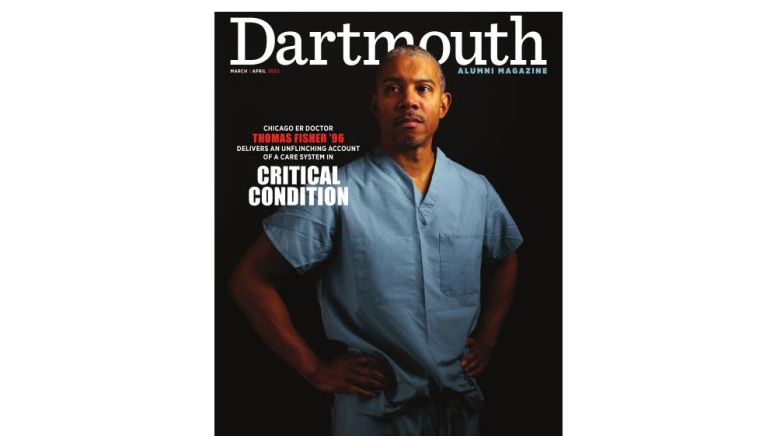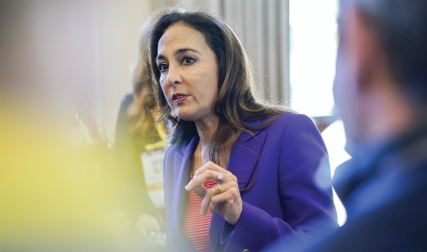Dead Heads
Thanks to DAM and Ethan Weinstein ’21 for the article about the 1978 Grateful Dead show in Hanover [“The Dead Zone,” March/April]. My buddies and I used to hitchhike or drive to N.Y.C. to hear the Dead at the Fillmore East whenever we could. Sometime in 1969-70, we wrote to the Dead asking them to play at Spaulding Auditorium. They responded with an offer to play two shows for something like $3,500! We joyously took the offer to the campus office that handled concerts and were sternly told that only they—not random students—booked concerts, and they showed us the door. Alas, the Dead wouldn’t come to Hanover until long after I left. No matter. I continued to go to their shows until 1995.
DON MEALS ’72
Burlington, Vermont
Like several people interviewed for the story, I worked the load-in and strike—nearly 24 hours end-to-end. I had a crew assignment backstage during the concert, so I didn’t see a minute of it. Quite the event, and I kept my backstage pass as a souvenir.
JOHN D. SNYDER ’79
Clifton Park, New York
Nice article, and it brings back a lot of great memories, but I think the author left out the best part of my story. On the way to get Bob Weir, we picked up our friend Pete, who we knew would love to meet the band. When we were driving back from the hotel to Thompson Arena, we passed a young guy hitchhiking and Weir said, “Let’s pick him up.” Of course, we obliged and had a fun ride back, talking about concerts and music and whatever else.
As we neared the arena, we knew we couldn’t drive in with Pete and the hitchhiker, so we dropped them off. Apparently, Pete then told the hitchhiker who he had been sharing the van with because the kid came charging up the middle of the street after the van. He never caught us, but I’m sure he had a good story to tell his buddies.
PHIL GIBBS ’81
Eastford, Connecticut
Road Rage
I love receiving my Dartmouth Alumni Magazine. I usually read it cover to cover, learning about the amazing work and achievements of my fellow grads. But I was really disappointed in “Gear Shift” [January/February]. Why is the magazine profiling a thief? This wasn’t even a good story to begin with. I myself am an event planner, and I understand the stresses that come with the job. But that doesn’t mean I quit one day, steal a bike, and travel the country as an unproductive member of society. Many people are stressed about work, even hate their jobs, but they don’t have the luxury to pitch a one-man Peloton temper tantrum. DAM should continue profiling alumni who work hard to support themselves, their families, and the greater good, rather than glorifying someone with such privilege, entitlement, and self-pity.
KATHRYN E. ARION ’11
Bethesda, Maryland
Sorry to say, “Gear Shift” is a problematic story that endorses the actions of a lead character who comes across as oblivious and obnoxious. This is precisely the type of entitled behavior that I found so very annoying when I was an undergrad at Dartmouth. Overly clever dude gets away with breaking the law where others likely would not, then writes a book at least partly to make money off the story—and then gets valorized in an uncritical profile. The story really bothered me (and others I know) on so many levels and looks particularly bad when conversations on equity and justice are taking place in the public arena. Not a good look.
SHAZIA IFTKHAR ’95
Philadelphia
Do the Math
I don’t think I’ve ever seen a harder-hitting, more succinct, more apt, or more important sidebar than the “By the Numbers” column [“Campus,” March/April]. It’s time.
RICK JOYCE ’85
Jersey City, New Jersey
Trailblazer
The description by Susan Dentzer ’77, Adv’22, of early coeducation and those turbulent times is very accurate [“Continuing Ed,” March/April]. There was much hostility toward women at first. Susan was a brave groundbreaker and remains a dedicated alumna.
CLAY SERENBETZ, TU’85
Friday Harbor, Washington
Price of Profit
As a minor donor to the alumni fund, I was delighted to see that our donations are well shepherded [“Bullish,” January/February]. While return on the endowment is crucial, it is not the only criteria for success. I am concerned about the “vulture capitalists,” as described by Robert Reich ’68 and others. The buyout of Sears and Toys “R” Us by hedge funds loaded the companies with debt and ran the companies into bankruptcy. Thousands of workers lost their jobs, and the hedge funds walked off with immense profits. This kind of greed makes many question unregulated capitalism. I hope the keepers of our endowment fund look at where our money goes and how it is used, not just the bottom line.
DON RIES ’66
Tucson, Arizona
Quick Thinking
Regarding “Big Picture: Olympic Flashback” [January/February], an almost non-story: Some friends took me to Sunapee [New Hampshire] for what turned out to be my last ski adventure beyond the golf course. I was walking across the area where real skiers finish out their runs when my path and that of “Chick” Igaya ’57 were about to intersect, he at speed. In some split-second magic of instinct, I jumped and he lay over very low and went right under me. Not a touch, and he was back up.
GEORGE HAND ’60
Boston
True Grit
I read with interest Rand Richards Cooper’s article about biathlete Susan Dunklee ’08 [“On Target,” January/February] and the story about the unstoppable three-decade Dartmouth head ski coach Cami Thompson Graves [“Behind the Podium” January/February] by Jim Collins ’84, which reinforced my pride that Dartmouth has held its place at the top of Olympic sport for more than 100 years. The issue highlighted Dunklee; Thompson; speed skater Jack Shea ’34; the five alums on the U.S. hockey team at the 1948 Winter Games in St. Moritz, Switzerland; three-time Olympic ski whiz Chick Igaya ’57, who took a silver medal for Japan in the 1956 VII Olympic Games at Cortina, Italy; Tommy Ford ’12; and on and on.
But let’s not forget my own favorite iconic downhill skier ever, the late Diana Golden ’84, a one-legged phenom—no outrigger—who won four gold medals at the 1986 World Disabled Championships. As she said, “A pet peeve of mine is that the public refuses to view what we do as athletic. We’re competitive. I like to win.”
Brothers Joe Walsh ’84 and Rob Walsh ’88 are not far behind in my admiration: Representing the United States in the “high partially sighted” category, they racked up bronze and gold, respectively, at the fourth Winter Paralympic Games in Innsbruck, Austria.
Dartmouth has been the true grit of American winter sports for a century, producing so many dedicated cold-sport athletes—none of whom were ever “disabled.”
PETER J. DORSEN ’66
Eagan, Minnesota
Editor’s note: DAM featured Diana Golden in an “Undying” feature in the September/October 2019 issue.
Big and Little Green Men
I am disappointed to find a call to censor opposing views in the letter from Kunal Malkani ’12 [“Your Turn,” January/February] about the interview with [UFO investigator] John White ’61 [“Continuing Ed,” November/December 2021]. Free speech is an honored tradition in academia and protected under the First Amendment. To support an alternative view, I recommend a more academically honest approach: Present a counterargument with facts, logic, and conclusions rather than seeking to stifle another’s presentation. Honest debate is both civil and fair, not repressive.
BILL BRIGDEN ’73
Sequim, Washington
I was surprised and dismayed to read about White and his UFO investigations. Why the alumni magazine of one of the best colleges in the country chose to publish this nonsense is hard to understand.
S. ADAM STANFORD ’83
San Ramon, California
White cites a lot of “authorities” in support of his bizarre ideas about UFOs and aliens, but do the DAM editors really think that this is a good testimonial for the College? His ideas display a vanity—that aliens would be interested in contacting us—and an arrogance—that Homo sapiens could be capable of communicating with them—that almost beggars belief. This is not good advertising for a Dartmouth (or even a Yale) education.
JOHN V. BALDWIN ’71
Cernobbio, Como, Italy




